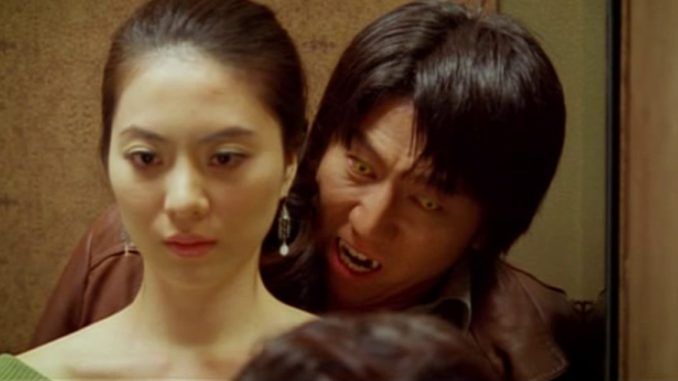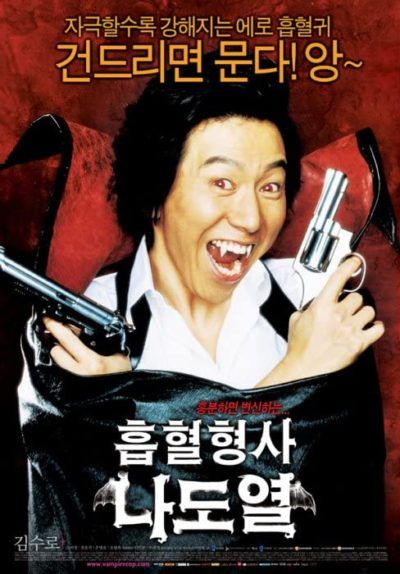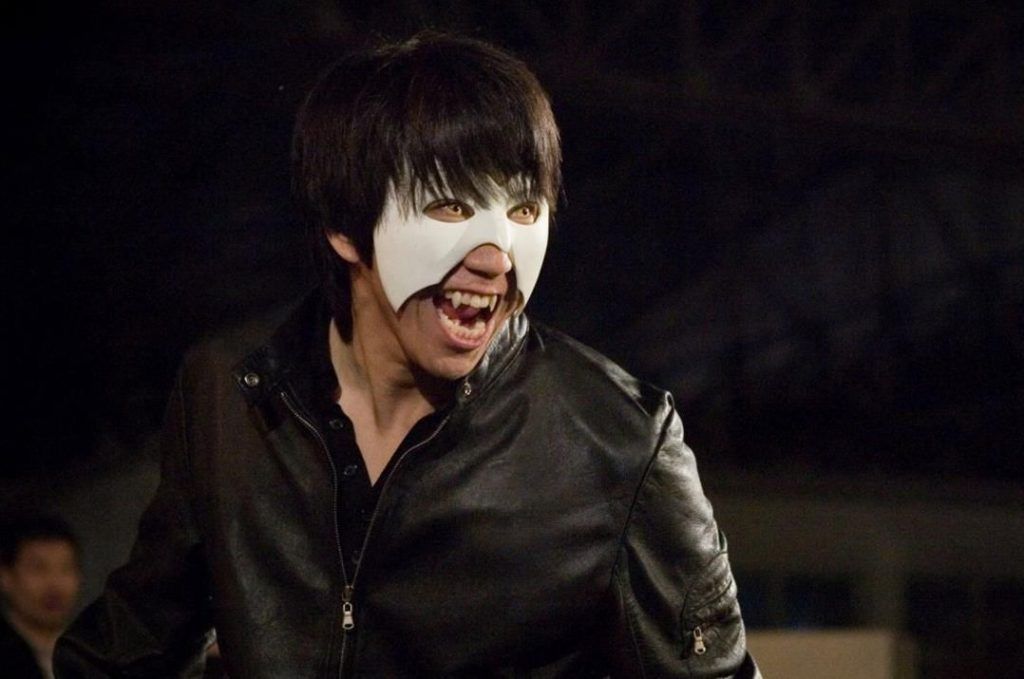
Rating: C+
Dir: Si-myung Lee
Star: Soo-Ro Kim, Cho Yeo-jeong, Byung-ho Son, Oh Kwang-rok
If nothing else, this certainly has a unique method of the protagonist becoming a vampire. It begins in Transylvania, where Dracula rises from a coffin in his castle, and is bitten by a mosquito. The insect, now apparently supercharged through the meal it just consumed, flies off and up to cruising altitude, where it hitches a ride on a Jumbo Jet heading across Europe to Korea. Arriving there, it ends up inside a DHL delivery truck, from which it escapes after the vehicle almost has a crash with the car of irascible local cop Do-yeol Na (Kim). He then becomes its next snack, before the mosquito meets a bloody and squishy fate, and we discover that vampirism is like malaria. You don’t need direct contact with an infected person to become a victim.
Before we go further, let’s address the most important question. Nobody, at any point in the film, calls the lead character “Ricky”. Yes, he is a cop, and he definitely becomes a vampire. Where the third word in the title comes from, escapes me entirely. The original Korean title does include “Do-yeol”, so maybe it makes sense in some dubbed version? I’d just have called it Vampire Cop for international release, and been done with it. Anyway, the specific form of vampirism here is rather intermittent. It does cause Do-yeol to sprout fangs and his eyes to go yellow, as well as conferring super strength, the ability to walk up walls and perform moderately convincing martial arts. However, this only kicks in when he is sexually aroused or really annoyed.
 Needless to say, the former happens considerably more often, this being a horror comedy. For example, he gets into an elevator with an attractive woman, and as it gradually becomes more crowded, he’s pressed into closer and closer proximity to her, in turn gradually bringing out the inner vamp (top). There’s a whole level of religious guilt involved here too. He goes to confession, and the priest puts him in contact with a vampire specialist (Oh), who sternly informs him that the only way Do-Yeol can regain humanity is if he withstands his urges. If he drink blood directly from a human victim, he’ll be condemned to spend eternity as a vampire. The rules on this seem a little vague: at one point, to heal Do-Yeol, the specialist cuts his hand and dribbles blood into Do-Yeol’s mouth. Which apparently doesn’t count.
Needless to say, the former happens considerably more often, this being a horror comedy. For example, he gets into an elevator with an attractive woman, and as it gradually becomes more crowded, he’s pressed into closer and closer proximity to her, in turn gradually bringing out the inner vamp (top). There’s a whole level of religious guilt involved here too. He goes to confession, and the priest puts him in contact with a vampire specialist (Oh), who sternly informs him that the only way Do-Yeol can regain humanity is if he withstands his urges. If he drink blood directly from a human victim, he’ll be condemned to spend eternity as a vampire. The rules on this seem a little vague: at one point, to heal Do-Yeol, the specialist cuts his hand and dribbles blood into Do-Yeol’s mouth. Which apparently doesn’t count.
It’s also true to say that vampirism might not be the worst of Na’s problems at this point. For he is also a corrupt policeman, working with Tak Mun-su (Son), operator of a gambling parlour, for example, tipping him off about an impending raid. [The place bets on cyberequines: CGI depicted horse-races, which seems such a pointless activity] Tak is not very nice, and when Na’s partner acquires a book of compromising data, the gloves come off, and the karaoke parties stop. When Do-yeol eventually rejects the increasingly immoral demands being made on him, Tak simply kidnaps the cop’s girlfriend, Yeong-Hee (Cho), and uses her as leverage. However, the benefits mentioned above, which Do-yeol has gained from his newly-acquired nocturnal status, are helpful in countering Tak’s threatening actions.
The subject matter here definitely brushes against the darker end of the spectrum, e.g. police corruption and organized crime. I’ve lost track of how many movies I’ve seen this year which do not exactly depict the Korean police in a flattering light. Yet the tone here is generally kept breezy, as the cover above likely suggests. For example, Na’s new fighting skills lead him to execute a half-decent Bruce Lee impression. There may not be much in the way of a corporeal resemblance, yet he has the mannerisms – both physical and vocal – down to an adequately amusing T. Despite being a sleazeball, you can’t help feel for Do-Yeol. This is not least because he genuinely comes to regret his association with Tak, and is prepared to go to any end to stop the gangster. At heart, this is a story of redemption, and would still potentially be interesting without the vampiric or supernatural elementa.

It is definitely a non-traditional take on the topic – or at least one filtered through a different culture, which picks and chooses the elements to incorporate, almost at random. For example, sunlight still burns Na up, but he appears in mirrors. There’s no particular sense of him having to drink to survive, it feels more like a compulsion; again, harking back to the sexualit and morality-based elements. These are interesting. There has often been a parallel between vampirism and sex, more or less explicitly. Yet here, the underlying message is a strongly moral one: you choose whether or not to give in to these desires. Either you control them, or they will control you. The ending then almost pulls a 180-degree turn in this department, even if the decision which Do-yoel makes is a very conscious and deliberate one. It clearly sets up a sequel which was, apparently, planned at one point, but never seems to have arrived.
There are times when the shifts in tone do become awkward, but it’s clear from the initial set-up that it’s not intended to be taken with utmost seriousness. If no other scene makes that clear, it’ll be the one where Na is running around, chased by villains, while trying to watch porn on his phone and awaken his inner beast. But it’s interesting that this is one of the few films where somebody genuinely becomes a better person after turning into a vampire. You would, admittedly, be hard-pushed to say that the vampirism was the cause of the improvement, yet if ever there was a case of cinematic life giving its hero lemons, Vampire Cop Ricky is likely to be it. Providing you are in a forgiving mood and hankering for the lemonade this provides, you could certainly do worse.
This review is part of our October 2023 feature, 31 Days of Vampires.
